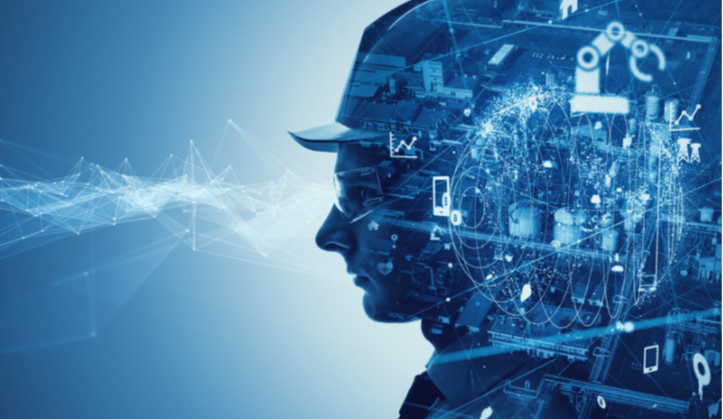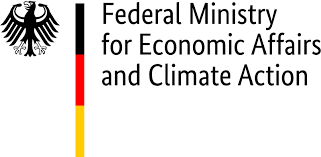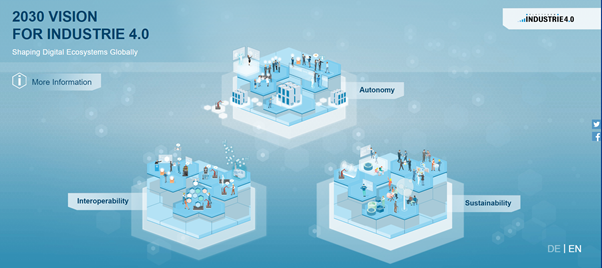
German-New Zealand Chamber of Commerce
Industry 4.0

A technological revolution that merges the physical, digital, and biological technologies to deliver unprecedented products and services in new and emerging sectors
The idea is to create a network for machines to communicate with human workers and each other — the Internet of Things (IoT) — to achieve a common goal. Industry 4.0 (4IR) ready machines will be able to produce production data, analyse this data and use it to make better decisions. In terms of the benefits, 4IR will create more efficient manufacturing processes and decrease costs for businesses in the long run.
The main components of Industry 4.0 include:
- Cyber-Physical System
- Internet of Things (IoT)/Internet of Services (IoS)
- Smart Factory
- Big Data
- Artificial Intelligence
Germany is the world’s leading 4IR nation. This is a significant achievement when until a few years ago “Industrie 4.0” was still an unproven catch-all term created to denote digitalization in the production space. Since 2011, 4IR has made the leap from abstract concept to tangible reality, leaving the test lab for the factory floor. In doing so, 4IR has become an international by-word for intelligent, networked production – with Germany consolidating its reputation as the worlds factory outfitter and a country capable of meeting the challenges of the digital age. Germany has the ideal conditions to be a global leader in innovative, internet-based production technology and service provision. Technological leadership and vision in the fields of manufacturing, automation, and software-based embedded systems, as well as historically strong industrial networks, lay the cornerstone for the long-term success of any given 4IR project.
The German government wants to utilise the enormous potential of 4IR to strengthen Germany’s manufacturing base. Smart, digital production processes present great opportunities for businesses – particularly for SMEs. The economic strength of Germany depends on small and medium-sized manufacturing companies. There are hundreds of German companies that use 4IR for their manufacturing processes and demonstrate the added value of digital solutions.

It therefore became central focus of the Federal Government’s Digital Agenda. In two funding programmes, the Ministry for Economic Affairs and Climate Action is already providing close to €100 million to foster research and innovation in the field of 4IR. Going a step further Plattform Industrie 4.0 has been created to ensure that Germany will remain a global leader on manufacturing and even sharpen its competitive edge.
The platform is steered and led by the federal minister for economic affairs and energy, Peter Altmaier, the federal minister of education and research, Anja Karliczek, and high-ranking representatives from industry, science, and the trade unions. Experts from business, science, associations, and the trade unions develop operational solutions together with representatives from various federal ministries in thematic working groups. The platform works with the chambers of industry and commerce and the electrical engineering, manufacturing, and computer business associations (ZVEI, VDMA, Bitkom) to hold events at which smaller businesses in particular, can be given help as they move into the 4IR world.
Since its establishment, Plattform Industrie 4.0 has developed into one of the world’s largest networks for the digitalisation of industry. The platform has entered a large number of partnerships with national and international alliances. An 4IR transfer network has been set up at national level to support SMEs. Through cooperation at international level, Plattform Industrie 4.0 uses its globally unique pool of technical and specialist expertise to address transnational issues in the fields of standardisation, IT security and legal frameworks. It also initiates and leads discussion on the digital transformation in industry. The platform coordinates these activities, networks stakeholders, and makes it possible to include many perspectives of very different interests.
Germany’s technological leadership in industrial production research and development are ideal conditions to be a global leader in innovative, internet-based production technology and service provision. Technological leadership and vision in the fields of manufacturing, automation, and software-based embedded systems, as well as historically strong industrial networks, lay the cornerstone for the long-term success of any given 4IR project. Joint efforts are the path to realize the opportunities for profitable growth in digital economy and to remain successful dealing with changing competitive dynamics. Government policy encourages companies to invest in new technologies to ensure they remain competitive in the future.
Being one of the few countries from which a thriving, market-driven launch sector has emerged, New Zealand is benefiting from a unique space economy which was established by commercial activity (‘New Space’) rather than a slow transition from large institutions. Its space economy is New Space driven and characterised by a mix of start-up to well-established, small to large, entrepreneur-driven, and privately funded space companies which service both government and non-government customers.
2030 Vision for Industrie 4.0 - Shaping Digital Ecosystems Globally

In this 2030 Vision, the stakeholders of Plattform Industrie 4.0 present a holistic approach to the shaping of digital ecosystems. Working from the specific situation and established strengths of Germany’s industrial base, their aim is to create a framework for a future data economy in line with the requirements of a social market economy: emphasising open ecosystems, diversity and plurality and supporting competition between all the stakeholders on the market.
The Vision is primarily addressed to industry and commerce in Germany, but explicitly highlights the importance of openness and a willingness to work together with partners in Europe and around the world.
Three closely interlinked strategic fields of action are crucial for a successful implementation of 4IR: autonomy, interoperability, and sustainability. The stakeholders on Plattform Industrie 4.0 commit jointly to these fields of action as guiding principles for the coming decade of the incipient scaling-up of 4IR in Germany, Europe, and globally. In a dialogue with all the stakeholders in the industrial society, the aim is to establish a framework for action so that – building on the current outstanding position of German industry in global terms, the digital transformation of German industry can take place in a sustainable manner, and 4IR can be successfully established throughout a flourishing German Mittelstand.
Contact us today!
The German-New Zealand Chamber of Commerce is always happy to answer your questions.
You can reach us from Monday to Friday from 09.00am - 04.30pm NZ time.
Level 14, 188 Quay Street, Auckland 1010
New Zealand
admin@germantrade.co.nz